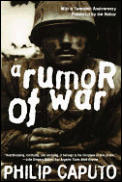Book Review: A Rumor of War

I am somewhat of a history buff, including military history. Over the past 10 years or so I've tried to learn more about the history of various parts of Asia, Europe, Africa and the United States. I've also read quite a few books on various wars and conflicts, both modern and historical.
From the moment the United States invaded Iraq, comparisons to the US involvement in Vietnam began to surface. And as time has worn on, the comparisons to me seemed to merit some sort of personal research. My friend Rick is also an avid reader, especially of military history and he suggested I read A Rumor of War, which has been touted as one of the defining pieces on Vietnam.
This book is brutally honest...not only in detailing the often surreal events in Vietnam and the consequences suffered by soldiers and civilians alike from often farcical decision made somewhere far off, but also in the depiction of what can do to perfectly sane and otherwise moral individuals.
It can be disturbing at times, but is so forthright in the presentation of human tragedy that every night I closed the book I sat wondering what I would do if thrust into such a situation.
The western world today seems to have some notion of War that is insane. There seems to be a sense amongst Americans and Europeans that our technology has advanced to the point that "precision" is the only acceptable conduct of War. I think Wendell Berry said it best when he said that if you can accept that death is part of War then you must accept that ANY death is part of War. This book reminds us that War is devastating and ugly and death makes no distinction between color of uniform or uniform at all.
Here are the publisher's comments:
When it first appeared, A Rumor of War brought home to American readers, with terrifying vividness and honesty, the devastating effects of the Vietnam War on the soldiers who fought there. And while it is a memoir of one young man’s experiences and therefore deeply personal, it is also a book that speaks powerfully to today’s students about the larger themes of human conscience, good and evil, and the desperate extremes men are forced to confront in any war.
A platoon commander in the first combat unit sent to fight in Vietnam, Lieutenant Caputo landed at Danang on March 8, 1965, convinced that American forces would win a quick and decisive victory over the Communists. Sixteen months later and without ceremony, Caputo left Vietnam a shell-shocked veteran whose youthful idealism and faith in the rightness of the war had been utterly shattered. A Rumor of War tells the story of that trajectory and allows us to see and feel the reality of the conflict as the author himself experienced it, from the weeks of tedium hacking through scorching jungles, to the sudden violence of ambushes and firefights, to the unbreakable bonds of friendship forged between soldiers, and finally to a sense of the war as having no purpose other than the fight for survival. The author gives us a precise, tactile view of both the emotional and physical reality of war.
When Caputo is reassigned to headquarters as “Officer in Charge of the Dead,” he chronicles the psychological cost of witnessing and recording the human toll of the war. And after his voluntary transfer to the frontlines, Caputo shows us that the major weapons of guerrilla fighting are booby traps and land mines, and that success is measured not in feet but in body counts. Nor does the author shrink from admitting the intoxicating intensity of combat, an experience so compelling that many soldiers felt nostalgic for it years after they’d left
Vietnam. Most troubling, Caputo gives us an unflinching view not only of remarkable bravery and heroism but also of the atrocities committed in Vietnam by ordinary men so numbed by fear and desperate to survive that their moral distinctions had collapsed.
More than a statement against war, Caputo’s memoir offers readers today a profoundly visceral sense of what war is and, as the author says, of “the things men do in war and the things war does to men.”
This edition includes a twentieth-anniversary postscript by the author.
Comments